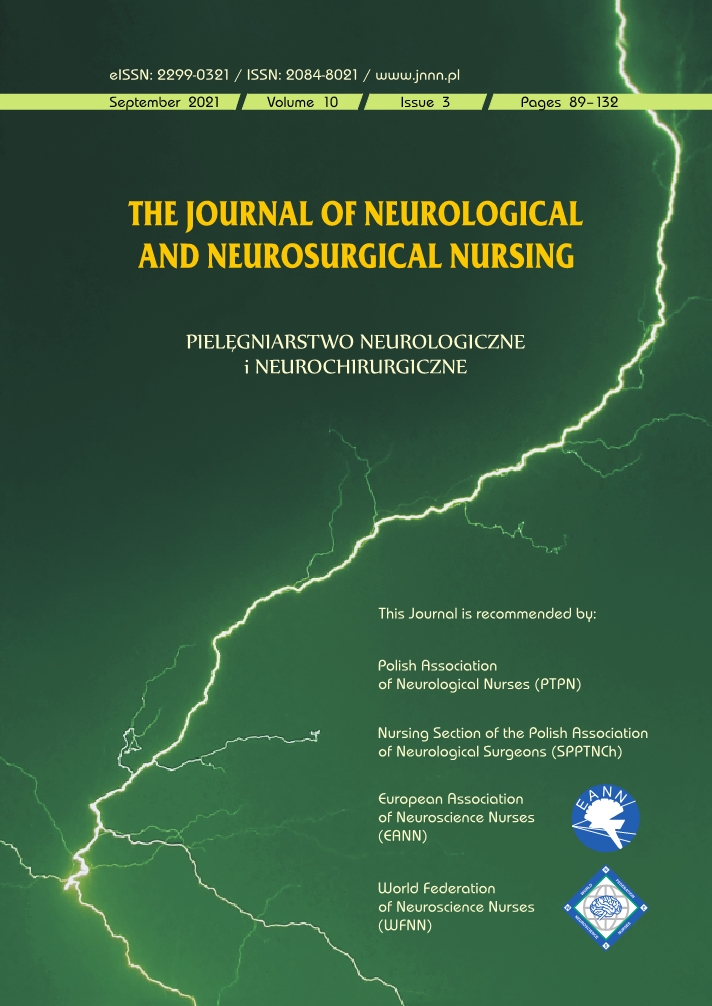Ocena satysfakcji rodziców z leczenia ludzkim rekombinowanym hormonem wzrostu dzieci z somatotropinową niedoczynnością przysadki
DOI:
https://doi.org/10.15225/PNN.2021.10.3.5Słowa kluczowe
dzieci, hormon wzrostu, niedoczynność przysadki, satysfakcja leczeniaAbstrakt
Wstęp. Wzrastanie jest zależne od czynników genetycznych, metabolicznych a także hormonalnych. Wzrost jest uwarunkowany stanem zdrowia, dostarczeniem składników odżywczych i prawidłowo działającego układu nerwowego. Niedobór hormonu wzrostu to zaburzenie, które nie powoduje typowych objawów somatycznych, natomiast w sposób negatywny wpływa na życie dziecka i funkcjonowanie w społeczeństwie.
Cel. Celem prowadzonego badana była ocena satysfakcji rodziców z leczenia ludzkim rekombinowanym hormonem wzrostu dzieci z somatotropinową niedoczynnością przysadki.
Materiał i metody. Badania prowadzone były wśród rodziców dzieci z somatotropinową niedoczynnością przysadki leczonych ludzkim rekombinowanym hormonem wzrostu w Wojewódzkim Szpitalu Zespolonym im. Rydygiera w Toruniu na oddziale Pediatrii, Endokrynologii, Diabetologii i Neurologii Dziecięcej, w terminie od 1.12.2019 do 1.02.2020 r. Do badania włączono 69 rodziców dzieci leczonych rekombinowanym hormonem wzrostu. Średni wiek rodziców dzieci biorących udział w badaniu, wynosił 11,77 ± 3,53 lat. Narzędziem badawczym były: metryczka, kwestionariusze ankiety własnej oraz standaryzowany kwestionariusz zdrowotny dla dzieci i młodzieży KIDSCREEN-52 w wersji dla rodziców.
Wyniki. Najwyższe średnie wartości, standaryzowanej skali KIDSCREEN-52 w wersji dla rodziców wykazano dla obszarów: nastroje i emocje (84,55 ± 12,73), relacje z rodzicami i dom (81,83 ± 10,88) oraz akceptacja społeczna (89,86 ± 12,86). Stwierdzono, że im wyższa jakość obszaru samopoczucia fizycznego i zdrowia, tym mniejsza potrzeba przygotowania psychicznego dziecka do wizyt w szpitalu w związku z leczeniem — rS = 0,254, p = 0,035. Analizy wykazały, że im wyższa jakość obszaru wsparcia społecznego i kolegów, tym mniejsze utrudnienie wynikające z wizyt na oddziale szpitalnym związanych z leczeniem — rS = 0,266, p = 0,027, również obserwowano mniejszą potrzebę przygotowania psychicznego dziecka do wizyt w szpitalu — rS = 0,261, p = 0,030.
Wnioski. Satysfakcja z leczenia rekombinowanym hormonem wzrostu jest zależna od czasu trwania kuracji i osiągniętych rezultatów wzrostowych. Rodzice dzieci z somatotropinową niedoczynnością przysadki są usatysfakcjonowani z leczenia rekombinowanym hormonem wzrostu i oceniają kuracje pozytywnie. (PNN 2021;10(3):120–125)
Bibliografia
Lecka-Ambroziak A., Walczak M., Szalecki M. Leczenie ludzkim rekombinowanym hormonem wzrostu dzieci niskorosłych w ramach programów lekowych NFZ. Pediatr Dypl. 2012;16(5):26–32.
Bednarczuk T. (Red.), Podstawy endokrynologii. ITEM Publishing, Warszawa 2017.
Pyrżak B., Walczak M. (Red.), Endokrynologia wieku rozwojowego. PZWL, Warszawa 2019.
Oświęcimska J. Niedobór hormonu wzrostu u dzieci młodych i dorosłych. Postepy Hig Med Dosw. 2016;70:928–937.
Pilch T., Bauman T. Zasady badań pedagogicznych. Strategie ilościowe i jakościowe. Wydawnictwo Akademickie „Żak”, Warszawa 2010.
Beń-Skowronek I. Leczenie niskorosłości u dzieci. Forum Pediatrii Praktycznej. 2016;11:6–16.
Zhou E., Hauser B.R., Jee Y.H. Genetic evaluation in children with short stature. Curr Opin Pediatr. 2021;33(4):458–463.
Yadav S., Dabas A. Approach to short stature. Indian J Pediatr. 2015;82(5):462–470.
Lewiński A., Smyczyńska J., Stawerska R. i wsp. Ogólnopolski Program Leczenia Ciężkiego Niedoboru Hormonu Wzrostu u Osób Dorosłych oraz u Młodzieży po Zakończeniu Terapii Promującej Wzrastanie. Endokrynol Pol. 2018;69(5):497–524.
Zubkiewicz-Kucharska A., Lasota W., Tumilewicz U., Matula A., Seifert M., Noczyńska A. Wpływ wybranych czynników na skuteczność leczenia rhGH u dzieci z somatotropinową niedoczynnością przysadki. Endokrynol Pediatr. 13/2014;4(49):19–26.
The Kidscreen Group Europe. The KIDSCREEN questionnaires. Quality of life questionnaires for children and adolescents. Pabst Science Publishers, Lengerich–Berlin–Bremen–Miami–Riga–Viernheim–Wien–Zagreb 2006.
Bielecka-Jasiocha J., Rymkiewicz-Kluczyńska B. Psychospołeczne funkcjonowanie dzieci niskorosłych. Endokrynol Pediatr. 7/2008;1(22):71–80.
Marini M.G., Chesi P., Mazzanti L. et al. Stories of experiences of care for growth hormone deficiency: the CRESCERE project. Future Sci OA. 2016;2(1):FSO82.
Graham S., Auyeung V., Weinman J. Exploring Potentially Modifiable Factors That Influence Treatment Non-Adherence Amongst Pediatric Growth Hormone Deficiency: A Qualitative Study. Patient Prefer Adherence. 2020;14:1889–1899.
Quitmann J., Bloemeke J., Silva N. et al. Quality of Life of Short-Statured Children Born Small for Gestational Age or Idiopathic Growth Hormone Deficiency Within 1 Year of Growth Hormone Treatment. Front Pediatr. 2019;7:164.
Lee P.A., Sävendahl L., Oliver I. et al. Comparison of response to 2-years’ growth hormone treatment in children with isolated growth hormone deficiency, born small for gestational age, idiopathic short stature, or multiple pituitary hormone deficiency: combined results from two large observational studies. Int J Pediatr Endocrinol. 2012;2012(1):22.
Pobrania
Opublikowane
Jak cytować
Numer
Dział
Licencja

Utwór dostępny jest na licencji Creative Commons Uznanie autorstwa – Bez utworów zależnych 4.0 Międzynarodowe.
Statystyki
Liczba wyświetleń i pobrań: 481
Liczba cytowań: 0
